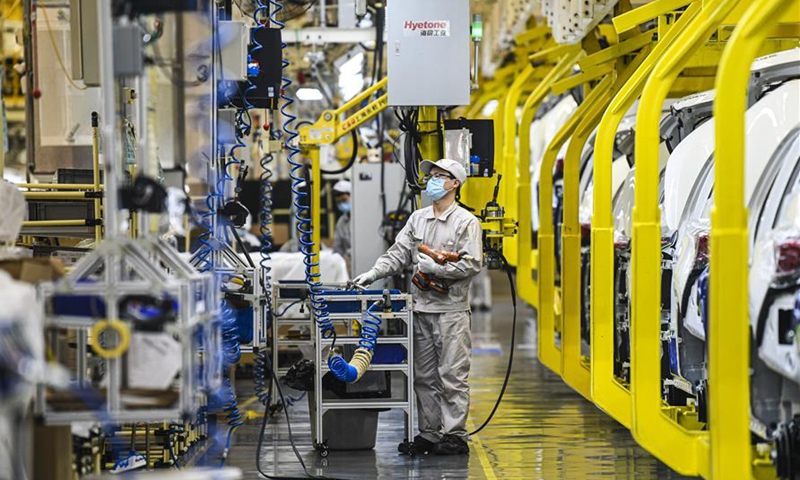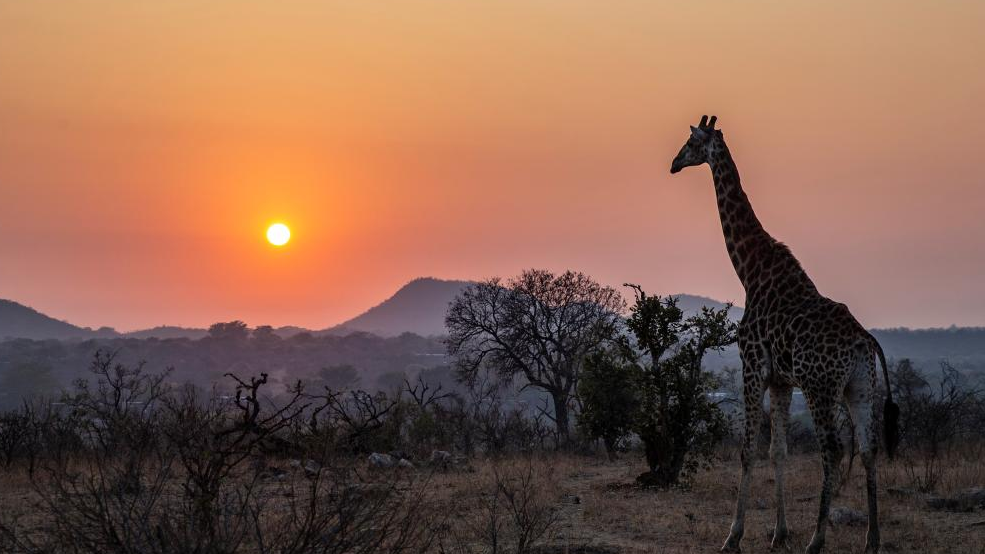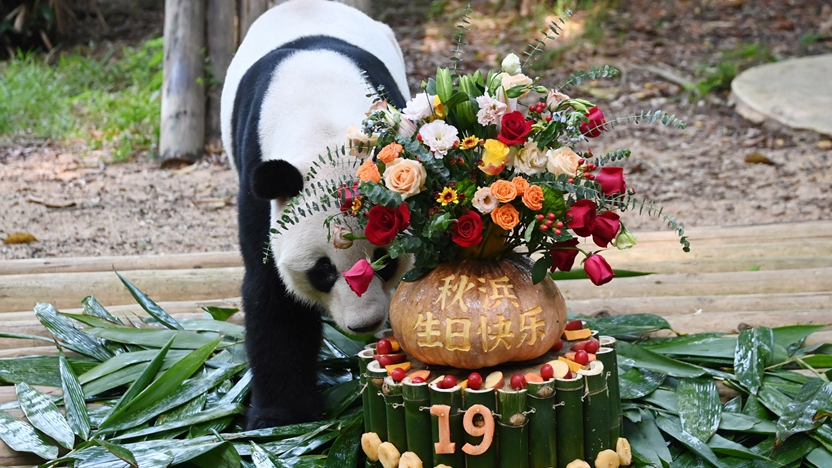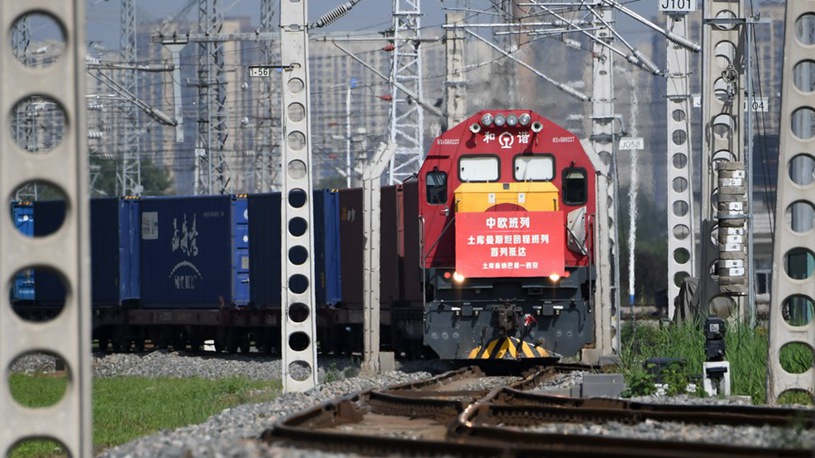China-Eurasia Expo kicks off in Xinjiang, rebukes US-led crackdown

Workers are busy at the Xinjiang car plant of GAC Motor in Urumqi, northwest China's Xinjiang Uygur Autonomous Region, Sept. 24, 2020. Urumqi has made efforts to propel the transformation and upgrading of its equipment manufacturing sector. A modern industrial system with a focus on intelligent, green and customized manufacturing is gradually taking shape in the city. At present, Xinjiang is home to more than 40 enterprises of scale in developing intelligent manufacturing. (Xinhua/Wang Fei)
Over 3,600 companies from 32 countries and regions attended the 7th China-Eurasia Expo, which was launched on Monday in Urumqi, Northwest China's Xinjiang Uygur Autonomous Region, as the region strives to build itself into a bridgehead of Belt and Road cooperation despite the US' economic suffocation of this strategically important region.
Underscoring China's commitment to make Xinjiang a core hub for the building of the China-proposed Belt and Road Initiative (BRI), Chinese President Xi Jinping sent a congratulatory letter to the opening of the expo, expressing hope that all parties can take this opportunity to tap the potential of cooperation and drive toward shared prosperity.
Xi said that China is willing to work with other countries to promote the Silk Road spirit that incorporates peace and cooperation, openness and inclusiveness, mutual learning as well as shared benefits, with the China-Eurasia Expo being a platform.
In July, during an inspection trip to the autonomous region, Xi pointed out that as countries jointly push forward the BRI, Xinjiang is no longer a remote inland area but forefront of the opening-up.
The expo, which will last from Monday through Thursday, was held even though the US and some Western countries, together with anti-China forces, have smeared China's governance in Xinjiang and made groundless accusations of "genocide" or "forced labor."
On June 21, the US' so-called Uyghur Forced Labor Prevention Act (UFLPA) took effect, which bans products made in China's Xinjiang, smearing the Chinese government over "oppression" of the Uygurs and other minority populations in its Xinjiang region.
The expo, held both online and offline due to a local epidemic flare-up, has attracted 3,600 enterprises to attend its online events, where nearly 17,000 exhibits of these enterprises from 32 countries and regions are to be shown.
It is expected that over 300 deals worth several hundred billion yuan will be inked during the expo, according to Urumqi Evening News on Sunday.
It comes on the heels of the recently concluded SCO summit, where countries agreed to foster energy sector cooperation, regional connectivity, financial cooperation featuring cross border settlement in local currencies and supply chain elasticity.
Analysts and exhibitors at the expo said the opening of the event and the efforts by Xinjiang to seek deeper cooperation with neighboring markets serve as a strong rebuke to the US' economic suffocation of the region.
Rebuke to the US
Zhang Hongping, chairwoman of the Xinjiang-based Ya'ou International Materials Exchange Center Co, said the strong economic complementarity between China's Xinjiang and Central Asian countries is set to be further facilitated with the enhanced economic cooperation pledged by leaders of countries at the SCO summit, and the business community is particularly happy with the China-Kyrgyzstan-Uzbekistan (CKU) railway.
Zhang said there is strong demand in Central Asian countries for China's daily necessities, ceramics, furniture, construction materials and machineries.
"Peoples in the region share similar cultures and customs, and deepened economic ties will further boost people-to-people exchanges," Zhang told the Global Times on Monday. "The relationship among peoples in the region, from economy and trade to culture and tourism, will serve as a strong rebuke to and cushion against the insolent bullying by the US, a faraway country."
"Xinjiang's development has been subject to a crackdown by the US and some Western countries in the past few years, while the reasons for their suppression do not actually exist. Rebuking the bullying, Xinjiang has made great achievements in maintaining regional stability. The West is only targeting China in their crackdown on Xinjiang, a plot that is doomed to fail," Li Yongquan, director of the Eurasian Social Development Research at the Development Research Center of the State Council, told the Global Times on Monday.
Observers said that the pragmatic cooperation with neighboring countries within the framework of the SCO will largely alleviate the difficulties imposed by the US and the West on Xinjiang, which has the strong backing of the whole nation of 1.4 billion people.
Vast opportunities
In the first eight months of this year, Xinjiang's trade with Kazakhstan, Uzbekistan, Tajikistan, Kyrgyzstan, and Turkmenistan surged 54.7 percent year-on-year to 111.16 billion yuan, Xinjiang Daily reported on Sunday, citing data from the local customs authority. Exports soared 66 percent year-on-year to 94.87 billion yuan.
Xinjiang's trade with five central Asian countries accounted for 76.4 percent of Xinjiang's total trade during the period. Xinjiang contributed to over one-third of China's total foreign trade with these countries.
Chen Guoliang, an official with the Urumqi customs authorities, was quoted as saying the strong complementarity between China and Central Asia countries meant bilateral trade has huge growth potential.
In particular, trade with Kyrgyzstan jumped 205.1 percent to 51.09 billion yuan during the January-August period.
A manager surnamed Han with Xinjiang Goldwind Science &Technology Co, a global leader in wind turbines used in wind farms, said the company views the Central Asian market, as well as the Middle East market, as a vital growth driver. "Despite many of these countries being energy-rich, the pursuit of low-carbon power generation is a global trend."
Zhang Danqing, chairwoman with Zhongzi Dayue (Zhejiang) Products Co, told the Global Times on Monday that the expo will showcase a lively, energetic Xinjiang while also allowing her company to gauge the policy of neighboring BRI markets.
The cooperation between China and other countries in the SCO offers huge potential.
SCO member countries accounted for nearly one-quarter of global GDP in 2021, according to an article by the Economic Daily on Monday. And trade among member countries reached $776 billion, growing 25 percent from the 2020 level.
Together with observer states, SCO member countries possess about 25 percent of global crude reserves and output, 30 percent of global refining capacity, 44 percent of global natural gas reserves and some 60 percent of global uranium production.
"After some Middle East countries joined the SCO, energy cooperation has attracted much attention as both the economic scale and population size of these energy producing and consuming countries are quite notable," Li noted.
Energy cooperation, regardless of what kind it is, will greatly boost Xinjiang's economy, as it is the node connecting China with those regions, the expert added.
Empowered by the Western Europe-Western China Highway, which stretches from Lianyungang in East China's Jiangsu Province to the Baltic Sea at St. Petersburg, and the CKU railway, Xinjiang's role as the core of the Silk Road Economic Belt will become even more crucial, further promoting the region's overall development, Li said.
Photos
Related Stories
Copyright © 2022 People's Daily Online. All Rights Reserved.









